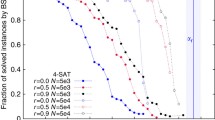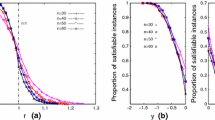Abstract
In this paper we propose a random CSP model, called Model GB, which is a natural generalization of standard Model B. This paper considers Model GB in the case where each constraint is easy to satisfy. In this case Model GB exhibits non-trivial behaviour (not trivially satisfiable or unsatisfiable) as the number of variables approaches infinity. A detailed analysis to obtain an asymptotic estimate (good to 1+o(1)) of the average number of nodes in a search tree used by the backtracking algorithm on Model GB is also presented. It is shown that the average number of nodes required for finding all solutions or proving that no solution exists grows exponentially with the number of variables. So this model might be an interesting distribution for studying the nature of hard instances and evaluating the performance of CSP algorithms. In addition, we further investigate the behaviour of the average number of nodes as r (the ratio of constraints to variables) varies. The results indicate that as r increases, random CSP instances get easier and easier to solve, and the base for the average number of nodes that is exponential in n tends to 1 as r approaches infinity. Therefore, although the average number of nodes used by the backtracking algorithm on random CSP is exponential, many CSP instances will be very easy to solve when r is sufficiently large.
Similar content being viewed by others
References
D. Achlioptas, L.M. Kirousis, E. Kranakis, D. Krizanc, M.S.O. Molloy and Y.C. Stamatiou, Random constraint satisfaction: A more accurate picture, in: Proc. of 3rd International Conference on Principles and Practice of Constraint Programming (CP-97) (Springer, 1997) pp. 107-120, submitted to Constraints.
K.M. Bugrara, On the average case analysis of some satisfiability model problems, Information Sciences 40 (1986) 21-37.
M.T. Chao and J. Franco, Probabilistic analysis of a generalization of the unit-clause literal selection heuristic for the k-satisfiability problem, Information Sciences 51 (1990) 289-314.
P.Cheeseman, B. Kanefsky and W. Taylor, Where the really hard problems are, in: Proceedings of IJCAI-91 (1991) pp. 331-337.
R. Dechter, Constraint satisfaction, in: MIT Encyclopedia of the Cognitive Sciences (MITECS) (January 1998) ftp://ftp.ics.uci.edu/pub/CSP-repository/papers/R68.ps.
J. Franco, On the probabilistic performance of algorithms for the satisfiability problem, Information Processing Letters 23 (1986) 103-106.
I.P. Gent, E. MacIntyre, P. Prosser, B.M. Smith and T. Walsh, Random constraint satisfaction: Flaws and structure, submmited to Constraints, http://www.cs.strath.edu.uk/?apes/apereports.html.
T. Hogg, Refining the phase transition in combinatorial search, Artificial Intelligence 81 (1996) 127-154.
D.E. Knuth, The Art of Computer Programming, Vol. 1 (Addison-Wesley, Reading, MA, 1975).
G. Kondrak and P.V. Beek, A theoretical valuation of selected algorithms, Artificial Intelligence 89 (1997) 365-387.
D. Mitchell, B. Selman and H. Levesque, Hard and easy distributions of SAT problems, in: Proceedings of AAAI-92 (1992) pp. 459-465.
P. Prosser, An empirical study of phase transitions in binary constraint satisfaction problems, Artificial Intelligence 81 (1996) 81-109.
P.W. Purdom, Backtracking and random constraint satisfaction, Annals of Mathematics and Artificial Intelligence 20 (1997) 393-410.
P.W. Purdom and C.A. Brown, An average time analysis of backtracking, SIAM Journal on Computing 10 (1981) 583-593.
P.W. Purdom and C.A. Brown, Polynomial-average-time satisfiability problems, Information Sciences 41 (1987) 23-42.
B.M. Smith and M.E. Dyer, Locating the phase transition in binary constraint satisfaction problems, Artificial Intelligence 81 (1996) 155-181.
C. Williams and T. Hogg, Exploiting the deep structure of constraint problems, Artificial Intelligence 70 (1994) 73-117.
K. Xu and W. Li, Exact phase transitions in random constraint satisfaction problems, Journal of Arti-ficial Intelligence Research 12 (2000) 93-103, http://www.jair.org/.
Author information
Authors and Affiliations
Rights and permissions
About this article
Cite this article
Xu, K., Li, W. An Average Analysis of Backtracking on Random Constraint Satisfaction Problems. Annals of Mathematics and Artificial Intelligence 33, 21–37 (2001). https://doi.org/10.1023/A:1012328830929
Issue Date:
DOI: https://doi.org/10.1023/A:1012328830929




